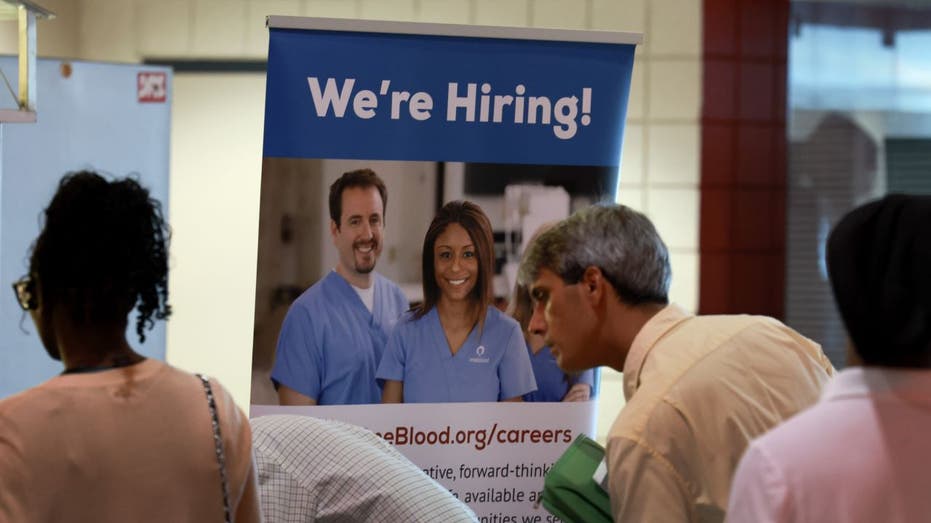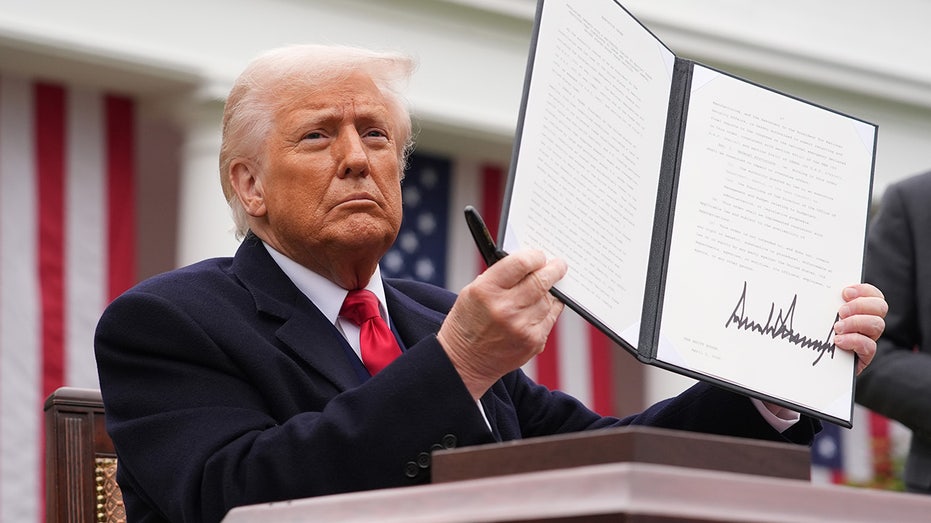US economy added jobs at a faster pace in March
Labor Department releases closely watched March jobs report
This is a ‘panic mode’ for the market, expert explains
‘The Claman Countdown’ panelists Peter Tuchman and Bob Michele unpack market volatility amid tariff fears.
The U.S. economy continued to add jobs in March and the pace of job gains picked up at a faster pace than a month ago despite economic uncertainty.
The Labor Department on Friday announced that employers added 228,000 jobs in March, above the estimate of LSEG economists, who anticipated 135,000 jobs gained.
The unemployment rate was 4.2%, slightly higher than a month ago and above economists' expectations. The number of jobs added in the prior two months were both revised, with job creation in January revised down by 14,000 from a gain of 125,000 to 111,000; while February was revised down by 34,000 from a gain of 151,000 to 117,000.
Taken together, the revisions reduce previously reported employment by 48,000 jobs.
JOB APPLICATIONS BY FEDERAL WORKERS SURGE AT AGENCIES TARGETED BY DOGE
Private sector payrolls added 209,000 jobs in March, well above the 127,000 projected by LSEG economists.
Government payrolls added 19,000 jobs in March. Within the sector, federal employment declined by 4,000 jobs in March after a decline of 11,000 jobs in January. The Bureau of Labor Statistics notes that employees on paid leave or are receiving ongoing severance pay are counted as employed in the establishment survey.
Manufacturing added 1,000 jobs last month, coming in below the 4,000 jobs LSEG economists anticipated the sector would add.
Healthcare added 53,600 jobs in March, trending close to the average monthly gain of 52,000 over the past 12 months. Employment rose in ambulatory healthcare services (+19,800), hospitals (+17,100), and nursing and residential care facilities (+16,700).
DOGE CUTS DRIVE LAYOFFS IN MARCH TO HIGHEST LEVEL SINCE PANDEMIC

The healthcare sector added the most jobs in March. (Joe Raedle/Getty Images / Getty Images)
Social assistance roles added 24,200 jobs in March, above the average monthly gain of 19,000 over the past 12 months. Most of the growth was in individual and family services, which accounted for 21,900 of the job gains.
Retail added 23,700 jobs in March, with workers returning from a strike contributing to gains at food and beverage retailers (+20,700), while general merchandise retailers lost 4,800 jobs. The sector has seen little change in employment over the last year.
Transportation and warehousing added 22,900 jobs in March, which nearly doubled the average gain over the past 12 months of 12,000. Within the sector, job gains in couriers and messengers (+15,800) and truck transportation (+9,600) were partially offset by job losses in warehousing and storage (-9,400).
The labor force participation rate was 62.5%, which has changed little over the month and past year.
March's job gains come amid increasing uncertainty about the economy amid renewed concerns about inflation and higher prices for consumers caused by President Donald Trump's tariffs, which have caused U.S. stocks to decline in recent days.
"The March employment report has to be viewed as backward looking, but on balance was a touch stronger than expected and gives the Federal Reserve the space to keep policy on extended hold as it monitors the impact of the Trump administration's aggressive actions on inflation," said Nancy Vanden Houten, lead U.S. economist at Oxford Economics. "We expect the tariffs to push inflation close to 4% this year."

President Donald Trump displays a signed executive order imposing tariffs on imported goods during a "Make America Wealthy Again" trade announcement event in the Rose Garden at the White House in Washington, D.C., on Wednesday. (Andrew Harnik/Getty Images / Getty Images)
Concerns over a widening trade war and the impact of tariffs on inflation have caused an increase in analysts' expectations of a potential recession.
"Investors may find some solace here but most likely, this employment report will be overshadowed by the tension bubbling up in global trade, particularly with China," said Jeffrey Roach, chief economist for LPL Financial. "The Fed's job got a lot more complex as inflation is not yet under control. Trade policy could become the catalyst which pushes the economy into recession."
Labor Secretary Lori Chavez-Deremer said in an appearance on FOX Business' "Varney & Co.," "I couldn't be more positive and happy for this jobs report this month — 228,000 jobs, we blew it out of the market, we blew it out of the water. That is not what people were expecting, but they are responding to Trump's vision and Trump's economy."
GET FOX BUSINESS ON THE GO BY CLICKING HERE
Federal Reserve Chair Jerome Powell is expected to speak later on the economic outlook. Central bank policymakers held rates steady at their last meeting in March, and Powell said they will be monitoring inflation data for signs of increasing price pressures, including those attributable to tariffs.
Economic uncertainty has caused the market's expectations for interest rate cuts to shift, as they now see a 40% probability of a rate cut at the Fed's next meeting in May, an increase from about 22% a day ago and 19% last week, according to the CME FedWatch tool.




















